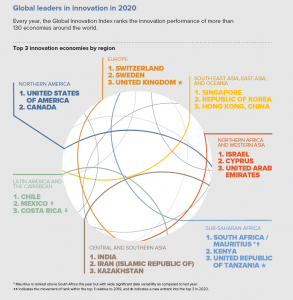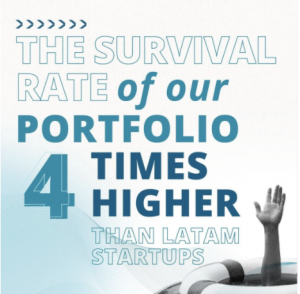Until 2010, Chile’s exports were heavily dependent upon copper; since then, the focus has shifted to making the country the«innovation and entrepreneurship hub»of Latin America. Home to some of the top companies in the world, such as in several industries Codelco (copper), Falabella (retail), Concha y Torro (wine), and Hortifruit, TECNOCAL, is honored to be located in the most innovative country in LATAM and the Caribbean.
#1. Chile is the most innovative country in the region (LATAM & Caribbean), outranking several larger economies according to the GII 2020.
In a region of significant imbalances, characterized by its low investments in R&D and innovation, its incipient use of IP systems, and the disconnection between the public and the private sectors in the prioritization of R&D innovation, Chile is the most innovative country in the region, above Mexico and Costa Rica. At #54 worldwide, Chile also outranks larger economies such as Brazil and Argentina.
#2. They have their own “Chile-con Valley” and invests heavily in innovation initiatives such as startups.
Since 2010, Chile has been stimulating an entrepreneurial spirit through investments. Currently valued at USD 2.1 billion, Start-Up Chile has already invested in 1,960 startups, 54% of which are still active today.
Their program offers equity-free money and over USD 100,000 in benefits for participants, a mentorship program, a community/network of local and international entrepreneurial partners and investors, a work visa, and a soft landing program. It is the number one accelerator program in the LATAM region and top 10 in the world.
#3. There is a high value placed on knowledge-intensive employment, especially in the tech industry.
In 2017, the Chilean government issued a special visa for highly trained foreigners working for local or international tech industries. According to InvestChile, this initiative benefits local tech companies and businesses participating in Start-Up Chile’s program while expediting the hiring process to under 15 days.
#4. Priority is given to investments in innovation that will enrich the local economy.
While startup accelerator programs have been deemed necessary and beneficial for a country’s development, these programs alone are not enough to gear an entire economy towards the future. Innovation must also contemplate industrial solutions that will help unlock future sources of economic growth.
Chile’s innovation performance is so outstanding that it outranks its own development and income per capita ranking. In LATAM, its performance is comparable yet superior to Uruguay. The GII 2020 report states while regional divides persist, some economies harbor significant innovation potential: «[In the LATAM/Caribbean region] only Chile, Uruguay and Brazil produce high levels of Scientific and technical articles…»
Commitment to growth is not just a promise by the government. The private sector actively participates in public discussions and the development of products and services that could yield future production and revenue sources.
An example of this is the AIE annual forum, which focuses on the future of industries such as energy, tech, communications, and automatization. Every year, the AIE (Association of Tech and Industry in Chile) joins businesses, higher education institutions, and government leaders to discuss pressing issues for these sectors and reward outstanding members of their communities. This integrated approach to economic development is key to a responsible and harmonious path to growth.
#5. Chile values data.
The valuation of data in a country weighs heavily in its potential to be trusted as a leader of innovation. For this to happen at a national level, government involvement is key.
The DataChileinitiative, developed by DataWheel,is an outstanding example supported by private companies and the national government. Data is not only captured in large indiscriminate amounts; it is also carefully integrated and exhibited in an interactive, visually attractive platform. This platform aims to improve the efficiency and efficacy of public policy decision-making, improve public services, identify opportunities for industrial diversification, and better inform the general public.
#6. Innovation initiatives in Chile are not entirely vulnerable to global venture capital declines.
Considering the financial crisis of 2008-2009 and comparing it to declines in Research and Development (R&D), Chile has been one of the countries least affected by these global movements in finance. Steady government investment, which is crucial to avoid decreases in expenditure in innovation after an economic downturn, has helped them stay ahead in the region.
The article, “How to Bring Global R&D into Latin America: Lessons from Chile” offers a brief history explaining this phenomenon:
«The story begins in 2008, when a government economic development agency called Corfo, working through the InnovaChile Committee, launched the International Centers of Excellence (ICE) program. It is one of the few programs in the world -and the first of its kind in Latin America -explicitly aimed at creating R&D centers where foreign universities, public research organizations, and private corporations will carry out R&D, technology transfer, and commercialization activities. The centers, known as ICEs, are selected based on their potential to boost the competitiveness of Chilean industry. To help reach this goal, the ICEs are required to hire a significant number of local scientists, establish collaboration agreements with domestic universities, and contract with local companies to conduct research.»
The program has since survived four presidential administrations. Today, the public sector currently finances most of R&D by providing R&D tax relief through a volume-based R&D tax credit. According to the OECD, since the introduction of R&D tax support in 2008, the importance of R&D tax relief has increased in both absolute and relative terms.
#7. They lead the sustainability ranking in LATAM.
Innovation needs to be sustainable over time. An environmental approach is useful for untapping Chile’s potential for welcoming businesses and developments that will gear its economy onto the 21st century and beyond.
In a 2020 Sustainability Ranking led by the economist Jeffrey Sachs and published by the University of Cambridge, Chile ranked #28 out of 193 countries for its commitment to comply with the Sustainable Development Goals established by the UN in 2005, surpassing more developed countries such as the US, Australia, and Italy in the ranking.
Chile has one of the strongest initiatives for sustainability in the world. The Ministry of Transportation has promised to double the 1060 Eco-electric buses in Santiago by the end of 2021. Additionally, Eurochile has amplified its commitment to sustainability with the creation of its Conference on a Circular Economy. Through this event, participants learn from various experts regarding ways to implement a Circular Economy approach to business by reducing waste and enabling the transformation of resources.
In the light of the recent news announcing a new constitution in Chile, Carolina Schmidt, current Minister of Environment in Chile and former president of the 2019 United Nations Climate Change Conference (COP25), has taken the opportunity to publicly mention sustainability as a key to unlock social, economic, and environmental inequality for present and future generations to come.
Sources:
- 2020 Global Innovation Index Report: https://globalinnovationindex.org/gii-2020-report
- AIE: https://encuentroanualaie2020.onlineeventos.events/
- Centre for Public Impact: https://www.centreforpublicimpact.org/case-study/innovation-development-in-chile/
- DataChile: https://es.datachile.io/
- DataWheel: https://www.datawheel.us/
- EuroChile: https://www.eurochile.cl/en/
- Conference-Economía Circular: https://economiacircular.eurochile.cl/
- InvestChile: https://investchile.gob.cl/
- ISSUES: Science & Technology (VOL. XXXII, NO. 2, WINTER 2016): https://issues.org/how-to-bring-global-rd-into-latin-america-lessons-from-chile/
- Ministerio del Medio Ambiente (Sept 2020): https://mma.gob.cl/chile-ocupa-el-primer-lugar-de-america-latina-en-ranking-de-sostenibilidad-publicado-por-la-universidad-de-cambridge/
- OECD R&D Tax Incentives Report Chile, 2019: https://www.oecd.org/sti/rd-tax-stats-chile.pdf
- PV Magazine (June 2020): https://www.pv-magazine-latam.com/2020/06/30/chile-duplicara-su-flota-de-autobuses-electricos-en-los-proximos-dos-meses/
- Start-Up Chile: https://www.startupchile.org



